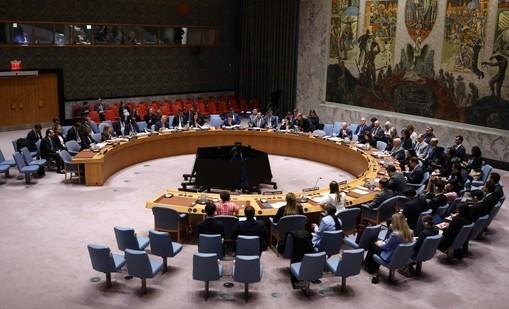
Was LeT involved? UNSC asks Pak on J&K attack, refuses to accept ‘false flag’ claim
In a significant development, the United Nations Security Council (UNSC) has refused to accept Pakistan’s “false flag” narrative on the recent Pahalgam attack in Jammu and Kashmir, instead questioning if the terror outfit Lashkar-e-Taiba (LeT), based in Pakistan, was likely to be involved in the attack. The UNSC members made these remarks during a closed-door meeting requested by Pakistan, reports said.
The Pahalgam attack, which took place on October 11, has sent shockwaves across the country, with several tourists being injured in the incident. The attack has been widely condemned by various stakeholders, including the Indian government, which has accused Pakistan-based terrorist groups of being involved in the attack.
Pakistan, however, has dismissed the allegations, claiming that the attack was a “false flag” operation designed to tarnish its image. The country has instead blamed the Indian government for the attack, claiming that it was a bid to distract from the Kashmir issue.
However, the UNSC members appear to have rejected Pakistan’s narrative, questioning the involvement of LeT, a Pakistan-based terrorist outfit, in the attack. According to reports, some members of the UNSC brought up the targeting of tourists on the basis of religion, highlighting the religious dimension of the attack.
The UNSC’s refusal to accept Pakistan’s “false flag” narrative is a significant development, as it suggests that the international community is not convinced by Pakistan’s explanation. The UNSC’s questioning of LeT’s involvement in the attack is also a significant blow to Pakistan’s claims, as it implies that the international community believes that the terror outfit may have played a role in the attack.
The Pahalgam attack has been widely condemned by various stakeholders, including the Indian government, which has accused Pakistan-based terrorist groups of being involved in the attack. The government has also sought to link the attack to the ongoing Kashmir issue, claiming that it is part of a larger conspiracy to destabilize the region.
Pakistan, however, has denied any involvement in the attack, claiming that the Indian government is trying to deflect attention from the Kashmir issue. The country has instead accused India of perpetuating violence in Kashmir and of using the attack as a pretext to escalate tensions in the region.
The UNSC’s refusal to accept Pakistan’s “false flag” narrative is a significant development in the ongoing Kashmir issue, as it suggests that the international community is not convinced by Pakistan’s explanation. The UNSC’s questioning of LeT’s involvement in the attack is also a significant blow to Pakistan’s claims, as it implies that the international community believes that the terror outfit may have played a role in the attack.
The Pahalgam attack is the latest in a series of incidents that have taken place in Jammu and Kashmir in recent months. The region has been plagued by violence and unrest in recent years, with various terrorist groups, including LeT, operating in the region.
The UNSC’s refusal to accept Pakistan’s “false flag” narrative is a significant development in the ongoing Kashmir issue, as it suggests that the international community is not convinced by Pakistan’s explanation. The UNSC’s questioning of LeT’s involvement in the attack is also a significant blow to Pakistan’s claims, as it implies that the international community believes that the terror outfit may have played a role in the attack.
The Pahalgam attack has also raised concerns about the safety of tourists in the region. The attack has sent shockwaves across the country, with several tourists being injured in the incident. The government has sought to reassure tourists that the incident was an isolated one and that the region is safe for tourism.
However, the incident has also raised concerns about the impact of terrorism on tourism in the region. The region has been plagued by violence and unrest in recent years, with various terrorist groups operating in the region. The Pahalgam attack has sent a strong message to tourists that the region is not safe, and that they should exercise caution when traveling to the region.
In conclusion, the UNSC’s refusal to accept Pakistan’s “false flag” narrative on the Pahalgam attack is a significant development in the ongoing Kashmir issue. The UNSC’s questioning of LeT’s involvement in the attack is also a significant blow to Pakistan’s claims, as it implies that the international community believes that the terror outfit may have played a role in the attack. The Pahalgam attack has sent shockwaves across the country, and has raised concerns about the safety of tourists in the region. The incident has also highlighted the need for the international community to take a stronger stance against terrorism in the region.



